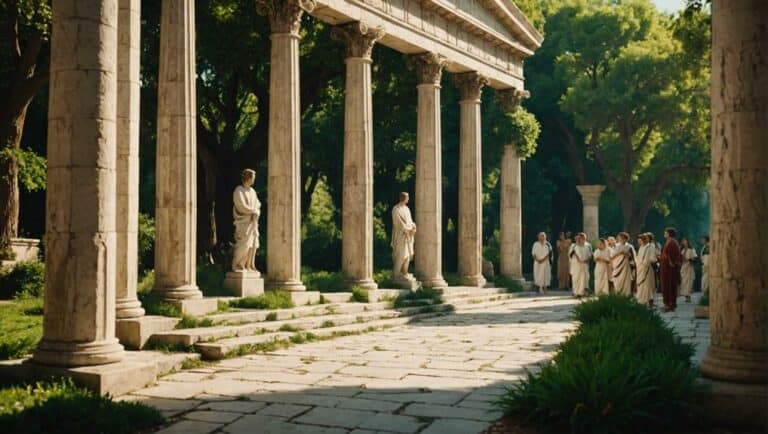Step into the Lyceum, Aristotle's legendary school founded in 335 BC, a cradle of philosophical debates and intellectual pursuits.
Discover how this iconic institution, now nestled in modern Athens, balanced physical training with groundbreaking scientific inquiry and practical wisdom.
Historical Significance and Founding
Founding the Lyceum in 335 BC, Aristotle transformed it into a hub for philosophical inquiry and intellectual pursuits, building on its existing historical significance. The Lyceum, named after the Greek god Apollo Lyceus, was already a prominent venue in Athens where philosophers like Isocrates, Plato, and Socrates engaged in debates. Aristotle's establishment of the Lyceum solidified its reputation, aligning it with the Peripatetic school, which emphasized walking discussions and active learning.
Under Aristotle's guidance, the Lyceum became synonymous with a 'school of wisdom.' It wasn't just a place for passive learning but one where cooperative research and critical thinking were paramount. Scholars and students gathered to explore diverse fields, making intellectual pursuits the core of their activities. This cooperative environment fostered debates that encouraged rigorous examination of ideas, laying the groundwork for significant advancements in philosophy and other disciplines.
Aristotle's influence at the Lyceum extended beyond lectures. His method of engaging students in cooperative research and critical thinking made certain that the Lyceum wasn't merely an academic institution but a dynamic center for generating new knowledge. This historical significance cemented the Lyceum's role in shaping Western philosophy and influencing generations of thinkers.
Architectural Features
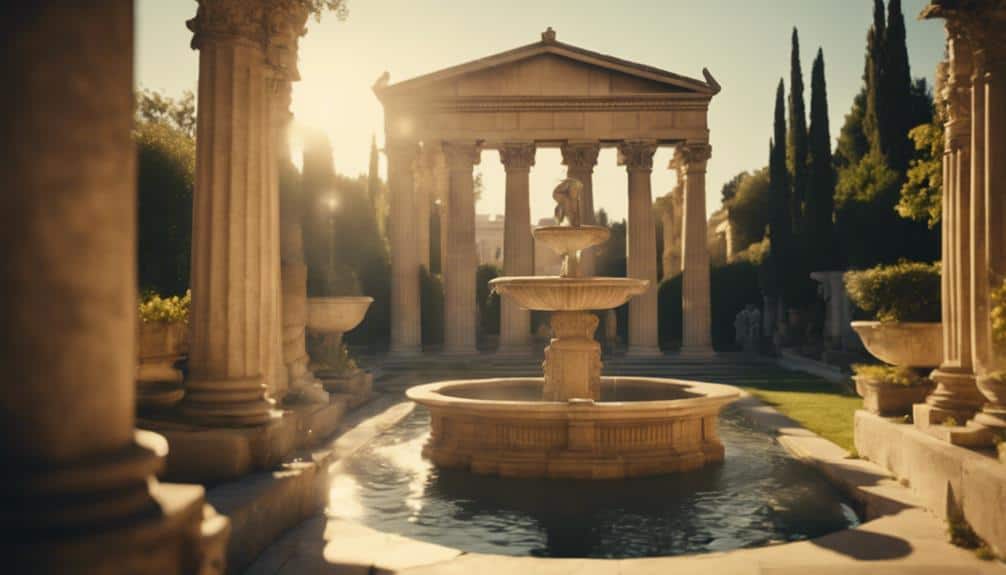
Aristotle's Lyceum wasn't just intellectually significant; its architectural features also played a vital role in fostering an environment conducive to both physical and philosophical activities. The Lyceum's layout included a gymnasium and a palaestra, necessary for physical exercise and training. The gymnasium served as a hub for not only physical conditioning but also for philosophical discussions, blending the physical with the intellectual.
Key structures such as the Apodyterion, where individuals could change their attire, and the Dromoi, designated running tracks, emphasized the importance of physical fitness. Stoas, covered walkways, provided shaded areas for gathering and dialogue, important for fostering Aristotle's method of peripatetic teaching.
Cult sanctuaries within the Lyceum highlighted the religious and cultural dimensions of the school, offering spaces for contemplation and worship. The site also hosted military exercises and assembly meetings, reflecting its multifunctional use. Located outside and east of ancient Athens' city walls, the Lyceum's architectural design mirrored its diverse role in education, religion, and civic life.
This careful integration of varied facilities made sure that the Lyceum remained a vibrant center for holistic development, balancing body, mind, and community.
Philosophical Legacy and Curriculum
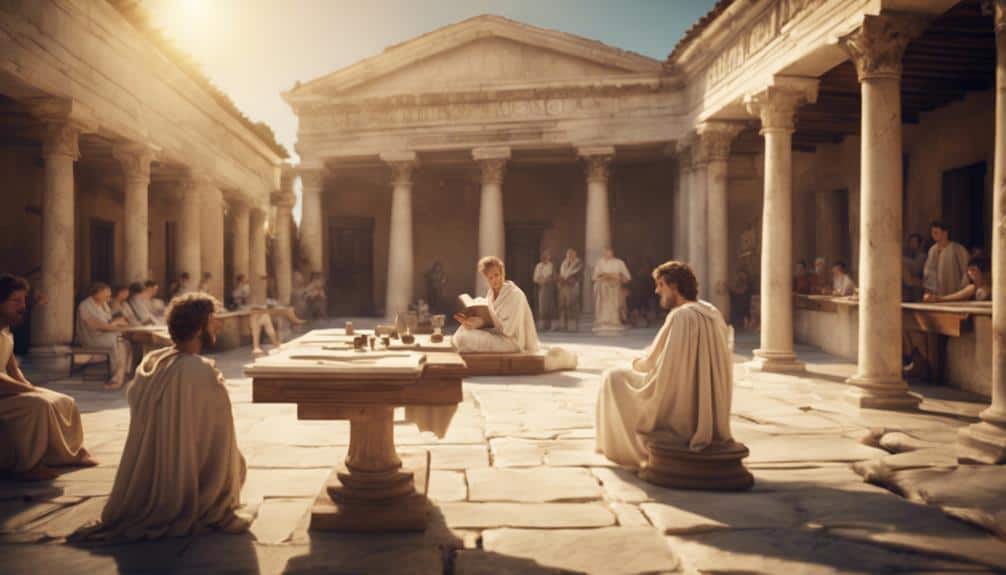
The Lyceum's curriculum integrated a broad spectrum of disciplines, fostering a holistic approach to education that combined physical, intellectual, and artistic pursuits. At Aristotle's school, students engaged in a variety of activities designed to cultivate both the mind and body. Physical education, music, poetry, rhetoric, and philosophy were all essential components, ensuring a well-rounded intellectual and personal development.
Philosophical discussions at the Lyceum emphasized cooperative research and critical thinking. Aristotle believed that true understanding emerged from engaging with diverse perspectives. As a result, scholars and students from various fields gathered to partake in rigorous debates and collaborative projects. This environment nurtured the virtues of critical analysis and practical wisdom, essential for navigating life's intricacies.
The curriculum also prioritized historical research and scientific inquiry. Students examined projects that explored the natural world and human history, guided by Aristotle's extensive knowledge. This emphasis on empirical observation and documentation laid the groundwork for future scholarly endeavors and contributed significantly to the advancement of various academic disciplines.
Aristotle's School and Library
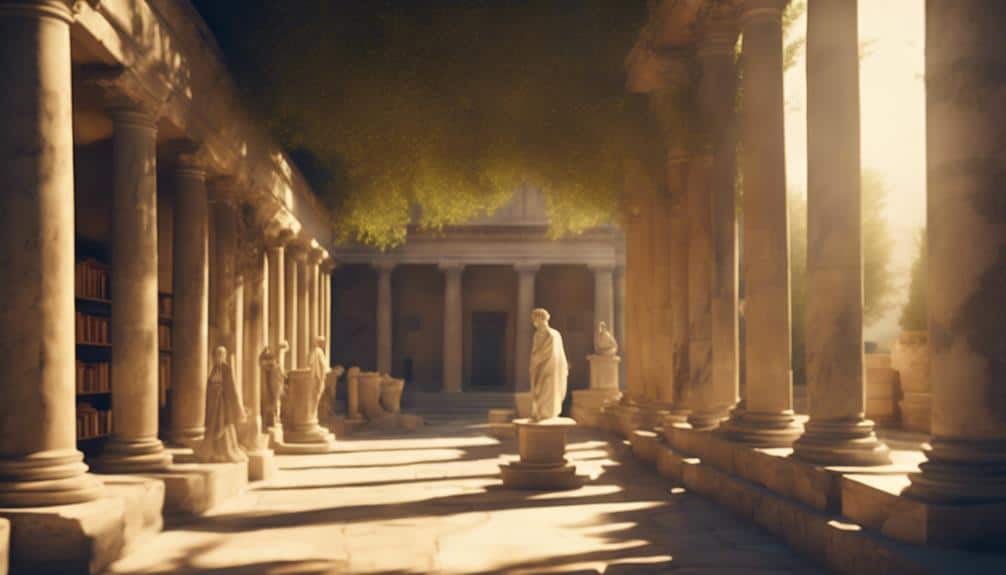
At The Lyceum, you're introduced to Aristotle's foundational principles, emphasizing the value of cooperative research and philosophical inquiry.
The school's collaborative research initiatives set a precedent for scientific exploration, with a significant library that served as a central resource.
This legacy of scientific inquiry continued under Theophrastus and later generations, underscoring the importance of knowledge preservation and education.
Aristotle's Foundational Principles
Within the bustling intellectual hub of ancient Athens, The Lyceum served as a pioneering institution where Aristotle and his pupils pursued rigorous investigation and thorough exploration. Founded in 335 BC, The Lyceum was more than just a school of philosophy; it was a center for extensive historical and scientific research projects.
Aristotle, with his vast knowledge and methodical approach, established the foundation for empirical examination, blending theoretical discussions with hands-on exploration. The school's library, a vital element of The Lyceum, housed a wealth of manuscripts, enabling Aristotle and his students to explore various fields of study.
Contributions from Alexander the Great, Aristotle's former pupil, enriched the school's resources, facilitating further advancements in research. After Aristotle's departure in 322 BC, Theophrastus, another prominent scholar, took over the leadership of both the school and its library, continuing the tradition of rigorous scholarship.
Eventually, the library passed to Neleus, who relocated it to Skepsis. This shift underscores the lasting impact of Aristotle's foundational principles, which continued to influence subsequent generations. By nurturing a culture of inquiry and systematic study, The Lyceum left an indelible mark on the intellectual landscape of the ancient world.
Collaborative Research Initiatives
Through fostering an environment where scholars and students actively collaborated, Aristotle's Lyceum became a beacon of innovative research and intellectual synergy. This collaborative spirit was central to the school's mission, with both historical and scientific research being pursued vigorously. Aristotle himself, along with his students, explored diverse fields, making significant advancements that would influence generations to come.
The Lyceum's library played a pivotal role in these collaborative research initiatives. It was more than just a repository of knowledge; it was a dynamic hub where ideas were exchanged and theories tested. Scholars and students worked together, analyzing texts and conducting experiments, thereby pushing the boundaries of contemporary understanding.
Alexander the Great, as a student, contributed to these endeavors, bringing in unique perspectives and resources that enriched the school's intellectual climate. After Aristotle's departure, Theophrastus continued this tradition, ensuring that the Lyceum remained a center of scholarly collaboration. Eventually, the library was entrusted to Neleus, who safeguarded it by relocating it to Skepsis.
This culture of collaborative research at the Lyceum exemplified the power of collective intellectual effort, laying the groundwork for future discoveries and scholarly pursuits.
Legacy of Scientific Inquiry
Aristotle's Lyceum not only fostered collaboration but also laid the foundation for a lasting legacy of scientific inquiry that would shape intellectual pursuits for centuries. At The Lyceum, scholars engaged in both historical and scientific research, establishing a precedent for rigorous, empirical study. This school of wisdom thrived on collaborative research, with contributions from notable figures like Alexander the Great, who bolstered Aristotle's extensive studies.
The Lyceum's library, a treasure trove of knowledge, was meticulously maintained by Aristotle and his successors. After Aristotle's departure in 322 BC, Theophrastus took the helm, ensuring the continuity of scholarly activities. The library was eventually passed down to Neleus, who safeguarded these invaluable texts by moving them to Skepsis. This act of preservation was vital in maintaining Aristotle's works for future scholars.
The Lyceum's impact can be summarized by its enduring contributions:
- Pioneered methods of scientific inquiry
- Emphasized the importance of collaborative research
- Influenced successive generations of philosophers
- Preserved critical historical research
- Shaped the direction of intellectual pursuits across centuries
Notable Figures and Present-Day Lyceum
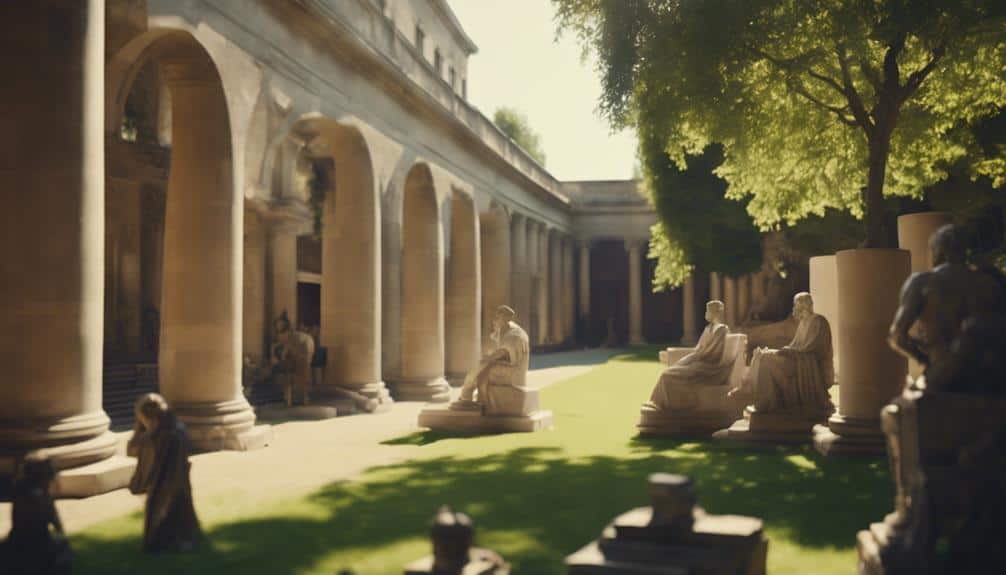
Leading the Lyceum for 36 years after Aristotle, Theophrastus played a pivotal role in maintaining and expanding the school's dedication to philosophical inquiry. Under his guidance, the Lyceum flourished, attracting scholars like Eudemus, Aristoxenus, and Dicaearchus. These notable figures made significant contributions to various fields, including logic, music theory, and geography, further solidifying the Lyceum's reputation as a bastion of intellectual rigor.
The legacy of these scholars was brought back to light in 1996 when excavations uncovered the remains of Aristotle's Lyceum. This discovery offered invaluable insights into the architectural and cultural aspects of the ancient institution. The remains revealed the physical space where these intellectual giants once gathered, fostering a deeper understanding of their contributions.
To preserve and showcase this historical treasure, plans were made to protect the site with canopies and open it to the public in 2009. Today, the present-day Lyceum in Athens stands as a tribute to its rich heritage. By visiting the excavated remains, you can connect with the profound legacy of Aristotle's school, appreciating the enduring impact of its scholars on modern thought.
Visiting the Lyceum
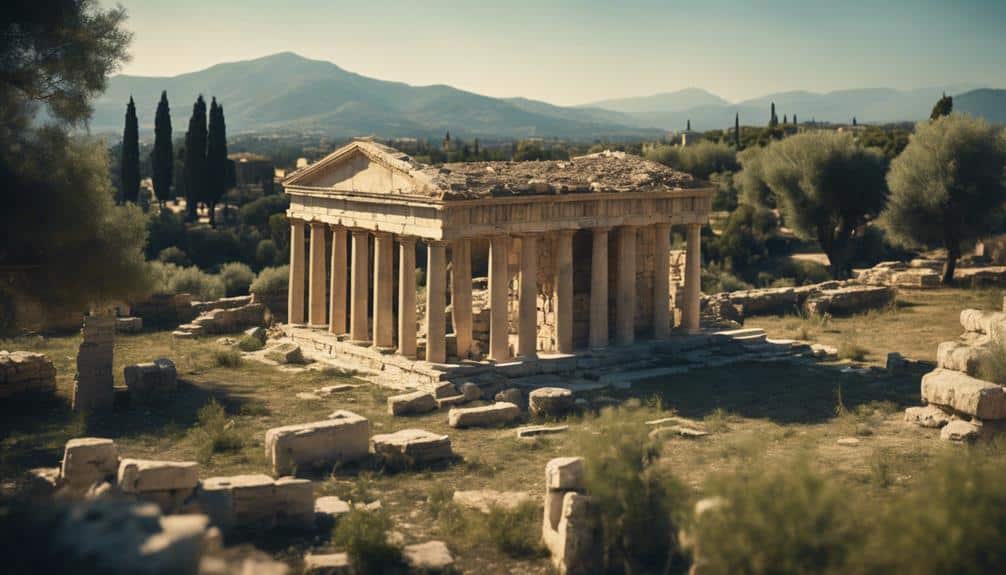
When you visit the Lyceum, you'll find it open daily from 8 a.m. to 8 p.m., offering free admission to explore its historical grounds.
Nestled between the Officers Club, Athens Conservatory, and Byzantine Museum, the Lyceum provides a tranquil setting with its natural landscape features, including tall grasses and birdsong.
The well-tended walkways lined with aromatic herbs invite reflection and immersion in the wisdom of Aristotle's ancient school.
Exploring Historical Grounds
Visiting the Lyceum today offers a unique opportunity to walk through the historical grounds where Aristotle once taught and nurtured intellectual thought. As you explore these grounds, you'll find yourself transported to ancient Athens, a hub of philosophical school and scholarly activity. The Lyceum wasn't just a center for intellectual pursuits but also for physical education, where students engaged in activities like boxing and wrestling.
You can meander through the well-tended walkways lined with aromatic herbs, reflecting on how Aristotle developed his methods of inductive and deductive reasoning and laid the groundwork for the scientific method. This site serves as a living museum, showcasing the blend of theoretical and practical learning that characterized Aristotle's teachings.
Key highlights of the Lyceum include:
- Remains of baths and a gymnasium, where physical education was an integral part of daily life.
- Palaestrae for wrestling and pankration, emphasizing the balance of body and mind.
- Natural landscape with tall grasses and birdsong, providing a serene backdrop for contemplation.
- Proximity to cultural landmarks, like the Athens Conservatory and Byzantine Museum.
- Symbolism of Athens' intellectual heritage, encapsulating Aristotle's impact on modern thought.
Exploring these grounds, you gain a deeper understanding of the environment that fostered one of history's greatest minds.
Admission and Hours
You can explore the Lyceum daily from 8 a.m. to 8 p.m., with free admission ensuring accessibility for everyone interested in experiencing Aristotle's historic school. Situated in the heart of Athens, nestled between the Officers Club and the Athens Conservatory, the Lyceum isn't only rich in history but also conveniently located for visitors.
This historical site embraces a serene environment, perfect for walking, reflection, and learning.
The Lyceum's well-tended walkways, lined with aromatic herbs, invite you on a journey of discovery. These pathways enhance the tranquil atmosphere, allowing you to fully immerse yourself in the legacy of one of history's greatest philosophers.
The fact that admission is free of charge makes this invaluable experience accessible to a wide audience, encouraging both local residents and international tourists to explore the wisdom and teachings of Aristotle.
The generous visiting hours provide ample opportunity for visitors to plan their day around this cultural excursion, ensuring that you can take your time to appreciate the historical significance of the site.
Natural Landscape Features
Immerse yourself in the Lyceum's natural landscape, where well-tended walkways lined with aromatic herbs and the gentle rustle of tall grasses create an atmosphere of serene contemplation. As you walk these paths, you'll find that the setting isn't just visually appealing but also deeply conducive to reflection and learning, echoing the original spirit of Aristotle's school.
The Lyceum, nestled between the Officers Club, Athens Conservatory, and Byzantine Museum, offers visitors a serene spot to unwind and absorb the surroundings. The natural landscape is meticulously maintained, ensuring an inviting environment for all.
- Enjoy the calming scent of aromatic herbs lining the walkways.
- Listen to the birdsongs that add a melodic backdrop to your visit.
- Explore the remnants of baths, gymnasium, and palaestrae, highlighting the Lyceum's historical emphasis on athleticism.
- Experience the tranquility of tall grasses swaying in the breeze.
- Benefit from free admission, making this a cost-effective educational outing.
Open daily from 8 a.m. to 8 p.m., the Lyceum welcomes visitors of all ages to explore its natural and historical features. This serene spot offers a unique opportunity to connect with the past while engaging in reflective thought and learning.


